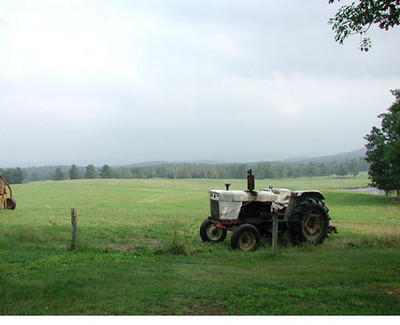Rachel’s Journal Roundup Q1 2023
Climate Change and the Farm Business —

This article analyzes the effects of climate change on food production and farm income. Climate change is expected to exacerbate economic, environmental, and biotic (pests/diseases) uncertainties currently present in agriculture. More specifically, the primary focus of the article is the effect of climate variability, subsidies, and farming practices on the stability of food production and farm income. To accomplish this, the study used 929 farms as case studies across England and Wales between 2005-2017. The study found that variability in temperature and rainfall reduces the stability of farm income and food production. Although variability in climate can be largely outside of the farmers’ control, the authors’ findings indicate that proper farm management may be able to mitigate this effect.
The study found that farms with greater agricultural diversity had more stable income. Likewise, bigger farms were found to have greater financial stability due to both economies of scale and greater soil diversity. Climate conditions were found to affect the stability of both farm income and food production. Subsidies, meanwhile, were found to have a minimal impact on the stability of farm income. The study also found that more concentrated farms (those that spend more on fertilizer, pesticide, and concentrated animal feed) had less income stability but more stable levels of food production. Moreover, the benefits of stable food production were found to benefit larger and medium size farms the most. Lastly, farms with high input expenditures were found to be less efficient, implying that although food production increased with more concentration, this did not correlate to additional income stability for farmers. The article recommends several policies to increase income stability without jeopardizing food production, such as reducing input use, diversifying agricultural output through the use of targeted incentives, and increased incentives for precision farming.
Harkness, C., Areal, F. J., Semenov, M. A., Senapati, N., Shield, I. F., & Bishop, J. (2022, November 24). Towards stability of food production and farm income in a variable climate. Ecological Economics. Retrieved March 10, 2023, from https://www.sciencedirect.com/science/article/pii/S0921800922003378
Coastal amenities and Sea level Rise—

This article explores the economic value of the sea coast through airbnb comparisons (the price of coastal properties vs. inland properties) across 67 municipalities in the Balearic Islands, Spain. The authors choose the Balearic Islands to study due to its high property value and high erosion risk. The study then discusses how climate change has affected coastal assets, and how action will need to be taken to reverse this trend. Although the study takes place across the Atlantic, the results are applicable in the United States due to the universal fact that humans (especially tourists) value coastal properties, and climate change is of course not limited to coastal Spain.
The study finds that Airbnb guests are willing to pay a premium for beach length, the presence of vegetation, the type of coastal frontage and whether the beach is in an urban environment. Meanwhile, the type of sand on a beach has virtually no effect on Airbnb prices. The study also mentions the importance of beach width, which by itself does not add much to the beach aesthetic, but provides important resiliency to erosion. The article concludes by mentioning the obvious economic benefits these coastal premiums provide for local communities, and their risk of eroding over time. Measures will need to be taken to preserve not just the coastal value of the Balearic Islands, but coastal areas across the world.
Boto-Garcia, D., & Leoni, V. (2022, October 1). The Economic Value of Coastal Amenities: Evidence from Beach Capitalization Effects in Peer-to-peer Markets – Environmental and Resource Economics. SpringerLink. Retrieved March 8, 2023, from https://link.springer.com/article/10.1007/s10640-022-00735-5
The Value of Dam Removals—
This article examines the pros and cons of dam removal in Maine. On one hand, removing a dam may enhance wildlife by allowing fish passage. On the other hand, dams can provide recreational and economic value to residents, and are even part of local historical identities. Current academic research is largely split on the topic, indicating that there is no general consensus on the issue of dam removal. Furthermore, the process for removing a dam is relatively complex. To study the effect of dam removal, the authors use 75 case studies – the largest sample size to date, and conclude that dam removal has a minimal impact on home value except for properties that are extremely close to the dam in question (100 meters or less).
Ultimately, the authors believe that dam removal would be beneficial for the environment with minimal economic cost. A limitation of this study is that it focused primarily on rural areas, so the results may not be applicable to urban and suburban environments.
Guilfoos, T., & Walsh, J. (2022, October 7). A Hedonic Study of New England Dam Removals. Ecological Economics. Retrieved March 8, 2023, from https://www.sciencedirect.com/science/article/pii/S0921800922002853
Marine Tourism Levies?–
This article outlines the need to adopt a behavioral approach built around marine conservation, specifically a tourism levy, whereby tourists would pay a premium when visiting (and using) the oceans of local communities. Unlike past proposals, whereby the revenue collected would be directly invested into local marine conservation efforts, the authors argue that since tourism is not heavily present in the global south (which would benefit the most from such a tax), the revenue from such a tourism levy should go towards a global marine conservation effort. The article surveys tourists to see if such an idea could work in practice. The results found that support for a “tourism levy” depended heavily on income and already present beliefs on the environment. Moreover, the study was limited to English speakers, as well as skewed towards wealthier tourists. As such, it is still hard to assess how practical a tourism levy would be. However, it is undeniable that action needs to be taken to address the degradation of marine ecosystems and wildlife. Overall, this article discusses a potential market solution to the proven “commons” problem of marine degradation.
Booth, H., Mourato, S., & Milner-Gulland, E. J. (2022, August 6). Investigating acceptance of marine tourism levies, to cover the opportunity costs of conservation for Coastal Communities. Ecological Economics. Retrieved March 9, 2023, from https://www.sciencedirect.com/science/article/pii/S0921800922002403
Water Quality and Property Values–
This article discusses the issue of water quality in the Chesapeake Bay. The Chesapeake Bay is the center of a multimillion dollar seafood industry – creating tens of thousands of jobs – and supports one of the largest property markets in the United States. However, despite recent improvements, declining water quality in the Chesapeake bay due to urban and agricultural runoff is putting these economic assets at risk. The article focuses on studying what, if any, correlation exists between water quality and home liquidity. The study collects data from properties within 2 km of the Chesapeake Bay and in either Anne Arundel, Baltimore, or Harford (all counties in Maryland) as well as the city of Baltimore. The authors explain the importance of this study by saying that a failure to account for the effect of water quality of home liquidity would result in policymakers underestimating the economic benefits of clean water – leading to a suboptimal outcome.
The study found that clean water does correlate with higher home liquidity. The correlation increased the closer houses were to the Chesapeake Bay, but was present at all distances. This was determined primarily by sellers getting more for their homes with less time on the market compared to areas with lower water quality. Shorter listing periods are beneficial to sellers in the form of reduced stress and less holding expenses. Home prices were also higher for houses closer to the Chesapeake Bay. Overall, the study suggests that the benefits from water quality improvement are 13.3% higher when effects on liquidity are considered alongside property value increases. Overall, this study provides an important and underreported perspective on the economic benefits of improving water quality.
Irwan, N., & Wolf, D. (2022, May 25). Time is money: Water quality’s impact on home liquidity and property values. Ecological Economics. Retrieved March 10, 2023, from https://www.sciencedirect.com/science/article/pii/S0921800922001446